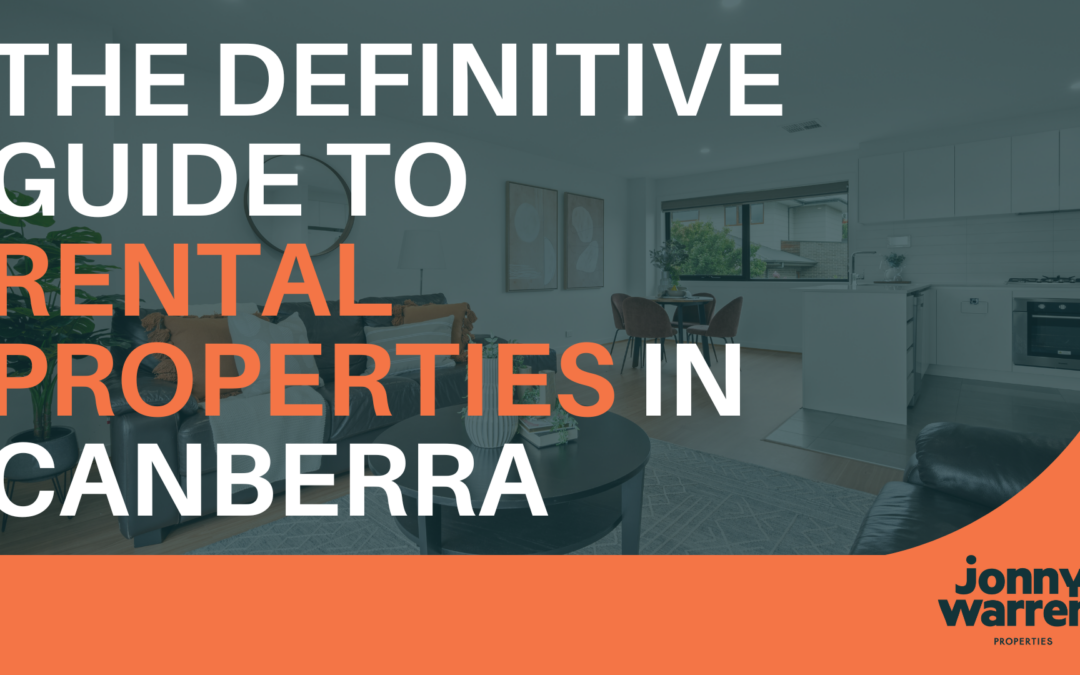
The Definitive Guide to Rental Properties in Canberra
The Definitive Guide to Rental Properties in Canberra
Exploring your options in rental properties can be both exciting and daunting. With numerous choices and factors to consider, it’s crucial to have a clear understanding of your property needs and desires.
In this guide, we dive into everything you need to consider and prepare for before signing that all-important rental agreement, ensuring you step into your rental journey fully equipped.
WHY RENT WHEN YOU CAN BUY?
Renting a property comes with a range of advantages:
- Cost-Effectiveness: Renting can often be more budget-friendly compared to the costs associated with buying a home.
- Flexibility in Relocation: Renters have the ease of moving between various locations – whether it’s a different neighbourhood, city, or even a new state.
- Ease of Adjusting Living Space: Renting offers the flexibility to easily scale up or down in living space, allowing adjustments according to financial situations or changing needs.
- Reduced Responsibility for Maintenance: In most rental agreements, the responsibility for major repairs and maintenance falls on the landlord, easing the financial burden on the renter.
- Access to Additional Facilities: Many rental properties come with amenities such as swimming pools, gyms, and community spaces that might be unaffordable or unavailable in purchased properties.
- No Property Taxes: Renters are not directly responsible for paying property taxes, a significant expense that homeowners must bear.
WHERE CAN I FIND RENTAL PROPERTIES?
When it comes to finding a rental property, leveraging online resources is a highly effective strategy.
Websites such as jonnywarren.com.au, realestate.com.au, domain.com.au, and allhomes.com.au can offer extensive listings and are excellent starting points at any level.
These real estate portals allow you to filter properties based on specific criteria like preferred suburbs, number of bedrooms, budget, and other desired features. This filtering results in a curated list of properties that match your needs.
To streamline your search, it’s advisable to save your search parameters and activate property alerts. This way, you’ll receive immediate notifications about new listings that fit your criteria, keeping you ahead in the rental market.
PREPARING TO APPLY FOR A RENTAL PROPERTY
Before you dive into the rental property market, it’s helpful to reach out to an experienced property manager. It’s vital to understand what’s required to secure a lease, especially for first-time renters with no rental history.
Here’s what you’ll need:
- Employment Verification and Proof of Income: This affirms your financial stability and ability to pay rent.
- Professional Reference: A reference from an employer or colleague provides credibility to your reliability and responsibility.
- Personal References: Non-relative references that vouch for your character are essential.
- Photo Identification: For identity verification.
Becoming a Tenant in Canberra & Surrounds:
To initiate the process of becoming a tenant in the ACT, it’s essential to navigate through the rental application process. This primarily requires you to present evidence of your income and references from prior landlords. (Only if required)
It’s equally crucial, prior to finalising the tenancy agreement, to ascertain the contact for addressing any potential issues during your tenancy. The guidelines governing rentals in the ACT are outlined in the Residential Tenancies Act 1997.
Tips for First-Time Renters
Before exploring rental properties, it’s important to get clear with your needs and wants. This step is essential as it gives you a clearer perspective on the things and amenities that would suit your lifestyle.
Start by asking yourself:
- Number of bedrooms and car spaces required?
- Preferences for the living space (e.g., large dining area, outdoor space for children)?
- Need for a pet-friendly environment?
- Preferred locations and their proximity to essential services?
This will help you in striking the right balance between your essential needs and areas where you can afford flexibility.
- Let’s say you want a large living space and a proper space for a studio or work area. Would you be willing to go for a property that had your ideal living space, but only came with a small space for your work area?
- Let’s assume you have a car and a motorbike, are you keen on signing off on a lease that doesn’t have enough garages to house your vehicles? You have to ask the right questions during an inspection, especially when off-street parking policies vary from suburb to suburb.
Once you’ve listed your essentials and preferences, it’s time to start your property hunt.
Both online real estate platforms and local real estate agents can be invaluable resources. Organise your findings and schedule inspections, keeping in mind that the rental market moves quickly.
The Importance of Property Inspections
When looking for a rental property, it’s essential to go beyond just viewing photos online. Actually visiting the property can reveal much more than pictures can convey.
Exploring potential homes in person can be quite enjoyable. As you tour different properties, it’s easy to start visualising your life there, like reading a book in that cosy corner during a lazy Sunday afternoon. It’s important to stay focused during these visits.
Your primary task is to check for any damage. If you find anything, document it with notes and photos, and inform the property manager.
This documentation ensures you won’t be held accountable for pre-existing issues, and it also prompts any necessary repairs before you move in. Additionally, verify that all appliances are functional, and confirm that the property matches its description.
A physical inspection also gives you the opportunity to meet with the leasing agent face-to-face, allowing you to ask questions and seek advice on the application process.
ACT RENTAL PROPERTY COSTS
There are certain costs that tenants in the ACT are exempt from bearing. Charges such as those for keys, swipe cards for property access, or any administrative fees related to bond processing or other move-in paperwork are not the tenant’s responsibility.
Should any disputes or uncertainties arise regarding these financial aspects, the ACT government offers comprehensive guidance through their Information Portal, a resourceful tool for tenants to navigate their rights and obligations. Further assistance can be found on the ACT government’s Community Service website.
Regarding rent increases:
The law mandates a fair process. Landlords or property managers are required to provide a written notice at least eight weeks prior to any rent hike. This notice must detail the exact amount of the increase and the date it becomes effective.
Importantly, this notice must be specifically addressed to the leaseholder and should be signed and dated to be considered valid. A notable aspect of renting in the ACT is that rent cannot be increased more than once annually, unless authorised by a tribunal – a rule that offers some stability to tenants.
Additional expenses that tenants might encounter include:
- Bond lodged with ACT Rental Bonds
- Costs for duplicating keys.
- Various charges associated with setting up utilities in the home.
- Any insurance costs that are legally mandated and specified in the tenancy agreement.
Understanding Agreements, Bonds, and Reports
Once you’ve chosen a rental property that ticks all the boxes, filled out all the necessary forms and (hopefully) an approved application, you’ll receive several important documents:
- Residential Tenancy Agreement: A legally binding contract outlining the terms of your tenancy.
- Bond Lodgement Form: For the bond, which is a security deposit separate from your rent.
- Condition Report: Details the property’s condition before you move in. Ensure it’s accurate and note any discrepancies.
These documents are crucial in defining your rights and responsibilities as a tenant and must be thoroughly understood and agreed upon.
What’s included in an RTA?
- Tenant, Owner, and Property Manager Details: Identification of the tenant, owner, and property manager (if applicable), including names and addresses.
- Tenancy Duration: Specific start and end dates of the tenancy agreement.
- Rent Details: Information on the rent amount, payment schedule, and preferred payment methods.
- Standard Terms: Clarification of the obligations and restrictions for both the tenant and the owner/property manager.
- Special Terms: Any additional terms that require prior mutual agreement.
- Tenancy Type and Length: Description of the tenancy’s nature (e.g., fixed-term or periodic) and its duration.
- Bond Requirements: The stipulated bond amount to be paid by the tenant.
- Additional Conditions and Rules: Outline of any other terms, conditions, or rules pertinent to the tenancy agreement.
Types of Tenancy Agreements:
There are two primary types of tenancy agreements to consider: Fixed-term and Periodic agreements.
Each of these agreements plays a crucial role in defining the relationship between tenant and landlord, and it’s essential to understand their differences and implications.
Fixed-Term Agreement (Stability and Predictability)
A fixed-term agreement is essentially a contractual commitment between a tenant and a landlord, allowing the tenant to reside in a rental property in the ACT for a predefined period.
Typically, these agreements span six months to a year, though they can extend for longer durations. A key feature of the fixed-term agreement is its potential for renewal, which can be negotiated between tenant and landlord before the current contract expires.
Periodic Agreement (Flexibility without Fixed End Dates)
This type of contract is unique in that it doesn’t stipulate a fixed end date. Despite this open-ended nature, a periodic agreement maintains the same rules and regulations as its fixed-term counterpart, offering a blend of continuity and flexibility.
PRO-TIP: READ AND RE-READ THE DOCUMENT
IT’S CRUCIAL to thoroughly read and understand this document, as it covers a range of obligations, this can include requirement for professional carpet cleaning at tenancy’s end and rules about having pets. The agreement also outlines the repercussions of falling behind on rent and other terms.
Is a Tenancy Agreement really that important?
You have to understand that without a signed tenancy agreement, tenants in the ACT may face abrupt eviction or rent increases, as landlords are within their legal rights to take such actions. Signing a tenancy agreement, therefore, provides a significant level of protection for tenants.
It also offers clarity on how the tenancy operates, including a clear understanding of both rights and responsibilities. Upon signing, tenants should receive a copy of the agreement for their records.
What is a Bond?
A bond is a separate arrangement from your regular rental payments, serving as a safeguard for the landlord in case you fail to adhere to the terms of your lease agreement. This bond is either refunded to you at the end of your lease term or can be applied to any necessary cleaning or repairs.
The bond is not a substitute for rent payments. Therefore, when vacating the property, your rent must be paid in full up to the specified date.
What’s included in the Condition Report?
A condition report is a comprehensive document detailing the state of a property before a tenant moves in. It encompasses all aspects of the property, including its fixtures and fittings. As a tenant, it’s crucial to meticulously compare the report with the actual condition of the property. This ensures that any pre-existing damage or issues are adequately noted.
This report is particularly vital in resolving disputes related to various aspects of the property, ranging from cleaning requirements to major and minor repairs. Therefore, a thorough examination of the report is essential.
For both the landlord and tenant, reaching a mutual agreement on the condition report is paramount. Additionally, it’s advisable for tenants to take photographs of the property prior to moving in. This provides a visual record of its original state, which can be invaluable in case of future disputes or issues.
Understanding Routine Inspections
(Random) routine inspections of the property are conducted by the property manager to ensure that it is well-maintained and any necessary repairs are addressed.
The frequency of these inspections varies by state or territory, and you should consult with your property manager to understand how you will be informed about upcoming inspections.
The following aspects are typically included in these inspections:
- Adherence to lease terms: Ensuring there are no illegal activities, such as drug labs.
- Cleanliness and tidiness: The property should be kept clean and orderly.
- Grounds maintenance: The outdoor areas should also be maintained in a neat condition.
- Property preservation: Checking that the property is not being damaged.
- Occupancy limits: Only the number of people listed on the tenancy agreement should be living at the property.
- Pet policy: Pets should not be kept on the property unless previously agreed upon.
- Maintenance issues: Identifying and addressing any necessary repairs.
Rental Properties in Canberra – FAQs
My lease is about to end, what should I do?
Once the designated end date of your lease specified in the agreement passes, the lease doesn’t just terminate abruptly. Instead, it transitions into what’s known as a ‘continuing agreement’. Under this arrangement, all involved parties remain bound by the terms originally set out in the lease.
For tenants desiring to stay beyond the current lease term, proactive communication is key. You should initiate a discussion with the property owner or the managing agent to express your interest in renewing the lease.
The decision to renew rests with the property owner. They have the discretion to either extend the lease, allow the tenancy to proceed under the existing terms, or provide the legally required notice for you to vacate the property.
Engaging in this dialogue well before your lease’s expiration date is advisable. It allows ample time for both you and the property owner or agent to plan and make necessary arrangements, ensuring a smooth transition regardless of the outcome.
Can I transfer my lease to another person?
In the event that you wish to end your lease early and have someone ready to take over the property, there are specific procedures to ensure a smooth and legal transition. The first step is to promptly inform your agent or property owner about your intentions. It’s essential to communicate your plan as early as possible to allow for the necessary legal and administrative processes.
However, it’s important to recognize that your agent or property owner is not obligated to automatically accept this arrangement. The prospective new tenant must undergo the standard application process, which includes filling out an application form, providing references, and meeting all other criteria required for tenancy approval.
Assuming the new tenant’s application is successful, they should not move into the property immediately. A final inspection of the property is necessary, and arrangements must be made for the transfer or release of your security bond. Only after these steps are completed can the new tenant officially take over the lease.
Can I exit my lease early?
If you find yourself in a situation where you need to vacate your rental property before your lease agreement expires, there are several responsibilities and potential consequences you should be aware of. Firstly, you will be accountable for any reasonable costs incurred by the property owner or agent in finding a new tenant. These expenses can include advertising and administrative costs related to re-leasing the property.
Moreover, your obligation to pay rent continues until a new tenant is found and a new lease agreement is signed. Both you and your agent have the right to look for a suitable replacement tenant. However, any potential tenant must undergo the usual application and screening process before they can be approved.
Leaving the property without informing your owner or agent can have serious repercussions. Not only could you lose your security bond, but such an action could also negatively impact your rental history. This could potentially make it more challenging for you to rent properties in the future.
Additionally, while laws in some regions may allow tenants to make minor modifications to the property, like installing picture hooks, you must ensure the property is returned to its original condition when you vacate. If any damage occurs due to the installation or removal of these fixtures, you could be held financially responsible for the repairs. It’s important to be fully aware of the specific rules and regulations of your state regarding such modifications.
The owner of my rental property decided to sell.
When the property you’re renting is put up for sale, the outcomes and implications depend largely on the specifics of your lease agreement and the intentions of the new owner.
Here’s what you might expect in different scenarios:
Sale to Another Investor: If the rental property is sold to another investor while you are still within the term of your lease, your tenancy should remain largely unaffected. The new owner takes over the role of your landlord, and your rights as a tenant continue as per the existing lease agreement.
Sale to an Owner-Occupier: In case the rental property is purchased by someone planning to occupy it themselves, the situation changes. You will likely be issued a notice to vacate the property. The terms of this notice should align with legal requirements, providing you with sufficient time to find alternative accommodation.
It’s important to note that during the sale process, your rights as a tenant regarding privacy and reasonable notice before inspections are maintained.
Repairs are needed in my rental property
To address repair needs in your rental property, it’s important to follow the correct procedures, which typically involve the following steps:
Notification of Repairs: Inform the property owner or agent about any required maintenance or repairs. Doing so provides a clear record of your request and ensures that both parties are on the same page.
Use of Maintenance Forms: Many rental properties provide specific maintenance request forms. These are often given to you when you first move into the property. Using these forms can streamline the process and ensure that your request is handled efficiently.
Avoid DIY Repairs: It’s crucial that you do not attempt to make the repairs yourself. Even if you have the skills, doing so can lead to issues with liability and compliance with your lease agreement. Your responsibility as a tenant is to report the problem, not to fix it.
Consult Your Lease Agreement: Your lease agreement will contain specific provisions on how to handle repairs or maintenance requests. It’s important to review these clauses to understand your rights and responsibilities, as well as the expected response time and process from the landlord or agent.
I am currently unable to pay my rent
If you’re unable to pay your rent temporarily, you should:
Contact Your Agent or Owner Immediately: Inform them as soon as possible about your situation.
Maintain Open Communication: Keep them updated on your circumstances.
Prompt and honest communication can often lead to an understanding or arrangement during such temporary difficulties. Ignoring the issue is not advisable, as it could worsen the situation.





